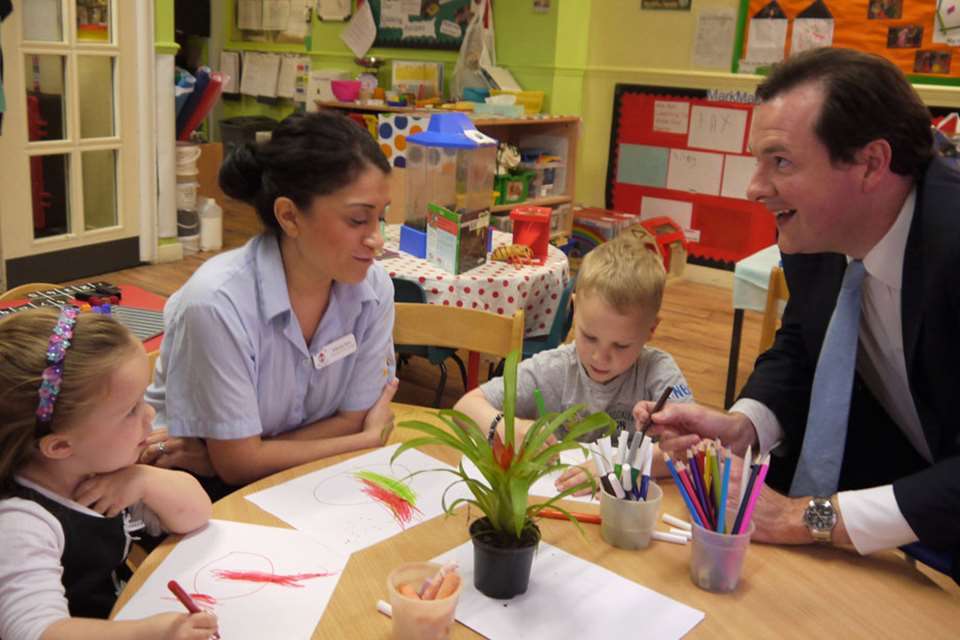Pupil premium extended to early years as tax-free childcare scheme expands
Tuesday, March 18, 2014
The Government is to extend the Pupil Premium to disadvantaged three- and four-year-olds from 2015.

Prime Minister David Cameron and Deputy Prime Minister Nick Clegg will announce today (18 March) a new Early Years Pupil Premium, which will see £50 million invested in 2015-16 to give early years providers delivering the early education places more support to help children from the most disadvantaged backgrounds.
More details about the Pupil Premium for three- and four-year-olds will be released by the Department for Education.
The extension of the Pupil Premium is one of a number of measures being announced by Government to provide more support to children from disadvantaged backgrounds and help millions of parents go out to work.
Tax-Free Childcare
The Government is to expand the Tax-Free Childcare scheme to working parents with children under the age of 12 a year earlier than intended.
Initially the scheme was planned for parents with children under five and disabled children under 17, with families with children under 12 years old being included in 2016.
The move to extend Tax Free Childcare to parents of older children will see around 1.9 million working families benefit from the scheme.
The amount of support households can receive through the scheme is to increase.
Parents will now receive 20 per cent of their annual childcare costs up to £10,000 a year, up from a limit of £6,000 previously. This means that parents will receive up to £2,000 towards their childcare costs per child per year.
All working families where parents earn at least £50 per week will be eligible for the Tax Free Childcare scheme from autumn 2015. This includes lone parents, those starting their own business or working part-time and parents on maternity, paternity or adoption leave.
Parents earning over £150,000 or receiving tax credits, Universal Credit or ESC are not eligible for the scheme.
Another change being brought in is that parents and providers will access Tax Free Childcare via a new online system. The Government will pay into the account at a rate of 20p for every 80p parents put in.
The new online Tax-Free Childcare accounts will be run by HM Revenue & Customs (HMRC), in partnership with National Savings & Investments (NS&I).
The accounts are designed to make it easier for parents and providers as they involve no fees and early years settings will receive each child’s payment from a single account rather than keep track of multiple payments relating to a single child from different bank and voucher accounts.
Universal Credit
To help more families move off of benefits and into employment, the Government also plans to increase the rate of childcare support under Universal Credit for taxpayers.
All families receiving Universal Credit will be able to claim 85 per cent support for childcare costs, up from 70 per cent. The move is expected to benefit around 300,000 working families.
The expansion of the Universal Credit will be funded by savings found from within the Universal Credit programme. Further details will included in the Autumn Statement.
Comments from the sector
The Childcare Voucher Providers Association (CVPA) has argued that the delivery of the new Tax-Free Childcare scheme will create a ‘dysfunctional monopoly market’.
Fiona Shields, chair of the CVPA, said, ‘There is a very real risk that the Government’s reforms to childcare support for working families will lead to increased complexity and cost, create uncertainty and remove choice.
‘In turning its back on organisations that are successfully delivering childcare support to working parents across the country, the Government is risking the delivery of its Tax-Free Childcare scheme.
‘We are concerned that parents will lose out on much-needed support promised to them by Government, at a time when childcare costs are exceeding annual mortgage repayments for hard-pressed families.’
The National Day Nurseries Association (NDNA) welcomed the announcements, but urged the Government to go further and make sure children get the most out of its investment by overhauling the ‘unwieldy’ and complex childcare funding system.
Its chief executive Purnima Tanuku said, ‘Nurseries know the pressure parents are under when it comes to balancing family budgets, so any additional help for childcare is welcome.
‘The new early years pupil premium must follow the child, so the extra money goes straight to the nursery and can be used to support high-quality care. We will be looking carefully at the details proposed.
‘While this help for disadvantaged three- and four-year- olds is welcome, it is well below the help given for older children in the school pupil premium. With nurseries telling us that free 15-hour nursery places are underfunded by an average £900 per child per year pushing up the fees parents have to pay for extra hours childcare, we're urging Government to build on this with more steps to solve the early years funding crisis. Early years funding must be ring-fenced so it can only be spent on under-fives.
‘The setting up of individual childcare accounts under tax free childcare is a great opportunity for Government to look seriously at NDNA's long standing proposal for a reformed funding system where all a families' tax benefits and free early education funding go into a single account that is paid direct to the childcarer of their choice.’
The Professional Association for Childcare and Early Years (PACEY) echoed the National Day Nurseries Association’s comments.
Liz Bayram, chief executive of PACEY, said, ‘We welcome the Government’s proposed increased financial support for parents.
'While the Government’s measures to improve access to childcare are positive, it is also important to remember that childcare provision has to be of high quality to benefit children the most, especially those living in disadvantage. PACEY is keen to see a greater investment in the support all childcare professionals receive to improve the quality of their setting; for example, by ensuring that free entitlement funding covers the full cost of its delivery to three- and four-year-olds and a growing number of two-year-olds.’
Anne Longfield, chief executive of 4Children, said, 'We are particularly pleased that there is extra help for disadvantaged three- and four-year-olds. 4Children has been calling for some time for further investment for disadvantaged children by extending the pupil premium to the early years.
'We also called for Tax Free Childcare to be extended to children over five and its extension now to children up to 12 is welcome. The overall increase in amount is also an important recognition of the costs that parents are facing. Nevertheless it is important to realise many parents will still have to find up to £8,000 for childcare each year.
'Proposals to increase the amount of childcare costs paid to families on Universal credit from 70 percent to 85 percent will be important in helping families return to work. This has been a long-standing call by the sector to address the anomoly on those who are working but pay no income tax. This could save families on low incomes a further £1,500 a year.
'These are positive and welcome developments that will bring much needed support to families who are struggling with high childcare costs and tight family budgets. As we approach the next general election the challenge is for all to political parties to set out how they will develop the childcare we know families need. This will include how all political parties intend to build on the Early Years premium and childcare proposals beyond 2015 to create a universal guarantee of childcare for all children 0-14.'
Neil Leitch, chief executive of the Pre-School Learning Alliance, said, ‘We welcome the news that more will be done to support parents struggling with the cost of childcare. However we remain concerned that the Government’s flagship childcare policy is fixated on getting parents back to work and is not sufficiently targeted to benefit those most at need. We would also challenge the wisdom of giving families with joint incomes of £300k per annum the same benefit. Many high earning parents must be uncomfortable with this additional tax break and, indeed, those we have spoken with, share our view.
'It is also interesting to note that the Department for Education’s (DfE’s) recent Parent Survey demonstrated that the vast majority of parents would like to spend more time caring for their children and this latest announcement does nothing to support parents who take the tough decision to sacrifice earnings to spend time caring and educating their children.
‘We greatly welcome the news of increased investment into the sector. At last someone in Government has acknowledged that delivering high quality education and care cannot be provided on the cheap. However, it is disappointing that the DfE continues to consult after a policy has been launched rather than beforehand. In this case, providers would like to be consulted on the criteria and detail of this new funding including how it will be administered to ensure it reaches and benefits the right children in their care.’
Voice the union has raised concerns that the announcement to expand upon and increase the Tax-Free Childcare scheme is more about the Government winning the next election than helping families or early years practitioners.
Its general secretary Deborah Lawson said, 'This funding will help families but what is being announced and its timing suggests that it is more about winning the next election than helping families or childcarers.
?'We want to know how this will address the crisis of low wages and lack of career structure endured by nursery staff. ?We agree with the recent announcement on up-skilling the profession by raising the entry requirements for entrants to Early Years Educator training courses, but what incentive is there to gain additional qualifications to raise standards if there is no proper salary and career structure for the early years workforce?
?'The sector’s caring nature has been taken advantage of for too long. Those who work in the early years are caring people who go the extra mile in children’s best interest. This should be properly recognised and rewarded.? We therefore call on the Government to match this tax free allowance with investment in the early years workforce.'
Anand Shukla, chief executive of the Family and Childcare Trust, said, 'Given that British parents pay more for childcare than in any other European country, today’s news of extra help for families with the cost of childcare is both important and timely.
'The additional support for working parents on the lowest incomes through Universal Credit and the extension of the Pupil Premium to disadvantaged three and four-year-olds are very positive steps, and we urge all political parties to match the Early Years Pupil Premium to that for school aged children.
'We’re delighted that the Prime Minister and the Deputy Prime Minister have today recognised that an investment in childcare is an investment both in our economy and in our future.'
Ryan Shorthouse, director of think tank Bright Blue, said, 'Considering the ongoing need for fiscal discipline and thus the tight funding envelope, the policy announcements are a real success for the childcare sector. It demonstrates that Government is convinced of the importance of childcare in boosting educational attainment and parental employment, which are vital for achieving individual and national prosperity.
'It is particularly encouraging to see the effective extension of the pupil premium to 3 and 4 year olds, which Bright Blue has campaigned for over the past year, so providers working with children from disadvantaged backgrounds are granted extra resource.
'However, the voucher scheme is an expensive way of supporting parents, especially as those very high up the income scale will benefit. It would have been cheaper for government to provide loans to these parents, which they could pay back gradually through the PAYE system. Parents would have been benefited from a scheme where their monthly payment for childcare could have been much lower than under this new voucher scheme.'
Jonathan Rallings, Barnardo’s assistant director of policy and research, said, ‘By helping close the yawning funding gap for poor three- and four-year-old children, and bringing down childcare costs to make work pay for their parents, the Government has today significantly improved the lives of the UK’s most disadvantaged families.
‘Today marks a victory for the UK’s most disadvantaged children, on which the government should be congratulated. We now look forward them boosting the nursery premium over time so that it eventually reaches the same level as the Pupil Premium.’












